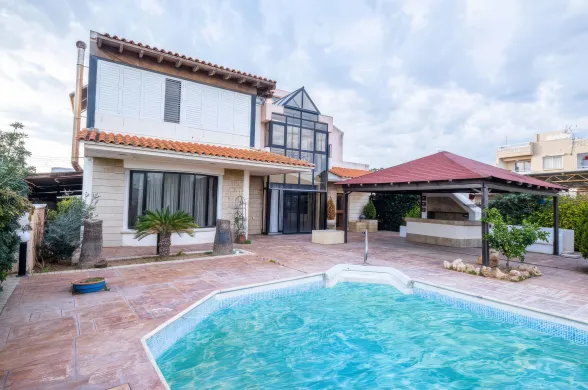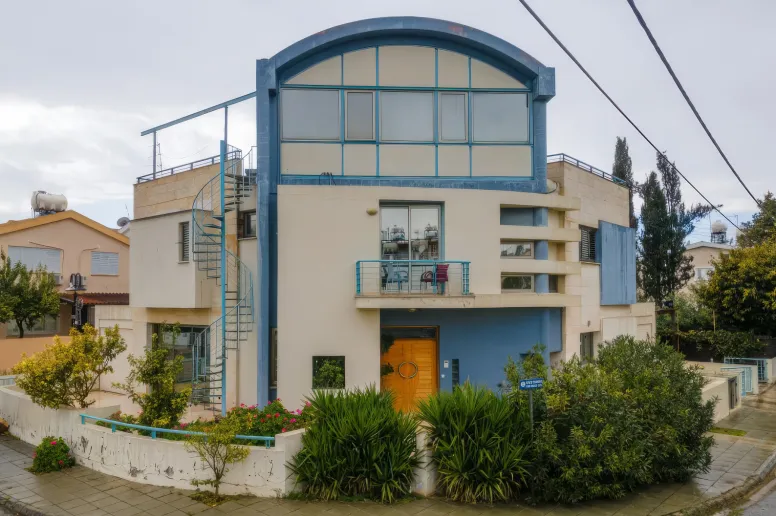- 5 beds
- 3 baths
- 256 m²
Properties for sale in Cyprus
- New builds 1336
- Apartments 1179
- Land 477
- Villas 397
- Penthouses 250
- Village houses 87
- Townhouses 16
- Bungalows 10
- Show more
- €375,000House for sale Engomi, Nicosia
- €480,000
- 5 beds
- 3 baths
- 230 m²
House for sale Engomi, Nicosia - €590,000
- 5 beds
- 3 baths
- 330 m²
House for sale Dali, Nicosia - €415,000
- 4 beds
- 2 baths
- 313 m²
House for sale Kaimakli, Nicosia City, Nicosia - Private pool
 €350,000
€350,000- 3 beds
- 3 baths
- 313 m²
House for sale Paralimni, Famagusta - €1,050,000
- 3 beds
- 3 baths
- 220 m²
House for sale Neo Chorio, Paphos - €960,000
- 6 beds
- 4 baths
- 690 m²
House for sale Peyia, Paphos - €365,000
- 6 beds
- 324 m²
House for sale Tseri, Nicosia - €190,000
- 4 beds
- 1 bath
- 155 m²
House for sale Latsia, Nicosia - €425,000
- 4 beds
- 4 baths
- 249 m²
House for sale Dali, Nicosia - €850,000
- 4 beds
- 4 baths
- 370 m²
House for sale Agios Nektarios, Limassol City, Limassol - €460,000
- 4 beds
- 2 baths
- 187 m²
Apartment for sale Mouttagiaka, Limassol - €460,000
- 3 beds
- 3 baths
- 350 m²
House for sale Sotiros, Larnaca City, Larnaca - €140,000
- 3 beds
- 2 baths
- 171 m²
Apartment for sale Strovolos, Nicosia - €119,000
- 2 beds
- 1 bath
- 78 m²
Apartment for sale Panagia, Palouriotissa, Nicosia City, Nicosia - €160,000
- 3 beds
- 2 baths
- 139 m²
Apartment for sale Paphos Town, Paphos - €119,000
- 2 beds
- 1 bath
- 78 m²
Apartment for sale Panagia, Palouriotissa, Nicosia City, Nicosia - €98,000
- 1 bed
- 1 bath
- 47 m²
Apartment for sale Latchi, Polis Chrysochous, Paphos - €133,500
- 2 beds
- 80 m²
Apartment for sale Kato Polemidia, Limassol - €122,000
- 2 beds
- 1 bath
- 57 m²
Apartment for sale Latchi, Polis Chrysochous, Paphos - €95,000
- 1 bed
- 1 bath
- 47 m²
Apartment for sale Latchi, Polis Chrysochous, Paphos - €95,000
- 1 bed
- 1 bath
- 47 m²
Apartment for sale Latchi, Polis Chrysochous, Paphos - €118,000
- 2 beds
- 1 bath
- 57 m²
Apartment for sale Latchi, Polis Chrysochous, Paphos - €176,500
- 3 beds
- 100 m²
Apartment for sale Kato Polemidia, Limassol - €139,000
- 2 beds
- 80 m²
Apartment for sale Kato Polemidia, Limassol - €136,000
- 2 beds
- 76 m²
Apartment for sale Kato Polemidia, Limassol - €104,000
- 1 bed
- 1 bath
- 50 m²
Apartment for sale Latchi, Polis Chrysochous, Paphos - €118,000
- 1 bed
- 1 bath
- 58 m²
Apartment for sale Latchi, Polis Chrysochous, Paphos - €111,000
- 1 bed
- 1 bath
- 50 m²
Apartment for sale Latchi, Polis Chrysochous, Paphos - €176,500
- 2 beds
- 77 m²
Apartment for sale Kato Polemidia, Limassol - €101,000
- 1 bed
- 1 bath
- 47 m²
Apartment for sale Latchi, Polis Chrysochous, Paphos - €144,500
- 2 beds
- 80 m²
Apartment for sale Kato Polemidia, Limassol - €310,000
- 6 beds
- 4 baths
- 306 m²
Apartment for sale Paphos Town, Paphos - €410,000
- 1 bed
- 1 bath
- 72 m²
Apartment for sale Katholiki, Limassol City, Limassol - €770,000
- 2 beds
- 3 baths
- 125 m²
Apartment for sale Katholiki, Limassol City, Limassol - €850,000
- 3 beds
- 3 baths
- 164 m²
Apartment for sale Katholiki, Limassol City, Limassol - €285,000
- 3 beds
- 2 baths
- 128 m²
Apartment for sale Kiti, Larnaca - €270,000
- 3 beds
- 2 baths
- 132 m²
Apartment for sale Oroklini, Larnaca - €165,000
- 1 bed
- 1 bath
- 60 m²
Apartment for sale Livadia, Larnaca - €319,000
- 2 beds
- 2 baths
- 107 m²
Apartment for sale Engomi, Nicosia - €490,000
- 3 beds
- 2 baths
- 159 m²
Apartment for sale Engomi, Nicosia - €450,000
- 3 beds
- 3 baths
- 156 m²
Apartment for sale Engomi, Nicosia
Property types in Cyprus
Popular searches
Districts in Cyprus
FAQs about Cyprus property
Is buying property in Cyprus a good investment?
Can foreigners buy real estate in Cyprus?
What is the best property investment in Cyprus?
How long does it take to buy a property in Cyprus?
Property prices in Cyprus
Our site lists 1,607 properties for sale in Cyprus, with prices ranging between €95,000 and €33,000,000.
As of February 2026, the median listing property price in Cyprus is €550,000.
The median listing property price per square meter is €3,808.
Limassol is the most expensive district in Cyprus, with a median listing property price of €669,000, while Larnaca claims the title of the most affordable area, with a median listing property price of €335,000.
New construction prices
There are 1,336 newly built homes for sale in Cyprus listed on DevelopersCyprus, and the range in price is between €118,000 and €33,000,000.
As of February 2026, the median new development price in Cyprus is €530,000.
What are the purchasing costs in addition to the sale price?
The extra costs of buying property in Cyprus include the following taxes and fees:
- Transfer fees: 1.5% to 4% (applies only to resale properties),
- Stamp duty: €0 (abolished). Contracts signed on or after January 1, 2026 are exempt.
- VAT on property: 19% for new properties and reduced to 5% for first-time buyers/primary residence (applies only to new construction). VAT is mutually exclusive with the Transfer fees; if you pay VAT, you are exempt from Transfer fees.
- Legal fees: approximately 0.5-1% of the purchase price + VAT (recommended for due diligence).
All Cyprus banks offer mortgage deals with average rates of [mort-rate-latest]. A stable source of income is necessary to get a mortgage.
When buying property with a mortgage, there must be a life insurance contract and one for fire and earthquake insurance (i.e., insurance for the structure of the house or building).
Find your luxury home in Cyprus with our experts
Our dedicated team of real estate professionals, led by Chris Michael, is here to guide you. For those who are looking to buy a house in Cyprus with us, we provide the following:
- real estate prices from developers and owners
- collection of luxury listings, off-plan and investment properties for sale
- traditional Cyprus village houses in rural areas and mountains
- remote and on-site viewing of properties in Cypriot cities, villages, and resorts
- return on investment estimation for the chosen property
- assistance in preparing all necessary documentation, including sales contracts
- reduced VAT applications for newly built home buyers
- legal support and permanent residency by investment applications with fixed fees through our partner lawyers
- post-purchase support, rent-out opportunities, and property management
Contact our estate agents today to get assistance with your Cyprus property search.
Buying property in Cyprus for residency
In [year], foreigners can buy a property and get Cyprus permanent residency if:
- The property is valued at least €300,000 plus VAT;
- The applicant has at least €50,000 in annual income from abroad.
- The applicant does not take up any paid work in the Republic.
Foreign nationals can acquire Cypriot citizenship after residing in Cyprus for 4 to 8 years, depending on their proficiency in Greek.
Investing in Cyprus property
According to the RICS Property Price Index for the third quarter of 2025, rental values are increasing, with apartments leading the way among residential properties.
The surest bet for rental property investment in Cyprus is Limassol, with a rental yield of 6%. The second-best is Nicosia, with 5%, followed by Larnaca and Paphos, each with 4%. Overall, the rental yield in Cyprus is 5.42% for apartments, 2.97% for houses, and 5.59% for offices (RICS Property Price Index 2025Q3).








































